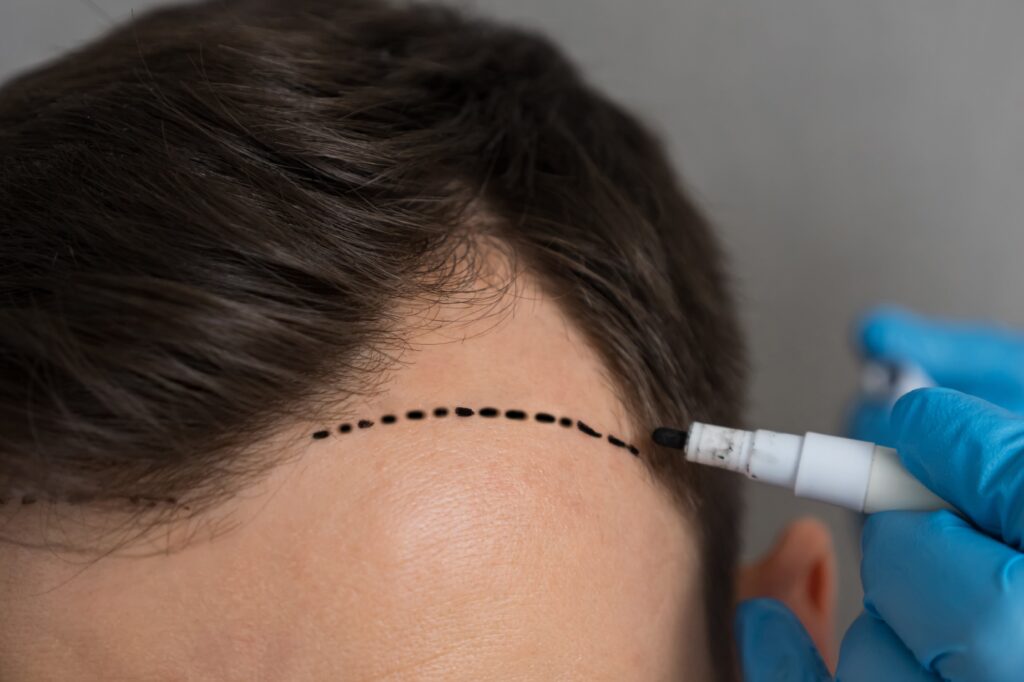Hair transplants are a popular and permanent solution for hair loss. But for many, the critical question remains: does insurance cover hair transplant procedures? The answer isn’t straightforward.
Insurance policies can vary across different companies and the coverage plans. However, in certain medical circumstances, you may be eligible for partial or full coverage depending on the policy. So, let’s explore the details of insurance coverage for hair transplant surgery, including when it may apply, and alternative options such as traveling abroad for affordable procedures.
Understanding Insurance and Cosmetic Procedures
Free Consultation!
Benefit from Dr. Acar’s experience in hair implants to achieve your dream result!
Hair transplant surgery is generally classified under cosmetic procedures. Cosmetic procedures mainly work to enhance appearance and are not generally a medical necessity. As most of these procedures are elective, most health insurance policies exclude them from coverage. However, some hair transplants can be a different story. Because, not all hair loss cases are cosmetic. Sometimes hair loss can stem from medical conditions, or treatments such as chemotherapy.
For example, if someone has suffered significant scalp burns or scarring from an accident, they may qualify for hair restoration surgery. It will be under the label of “reconstructive surgery” clause of their health insurance policy. In such cases, the insurance may cover all or most of the cost of the procedure. So make sure to differentiate between cosmetic and reconstructive surgery when seeking coverage.
Types of Insurance That May Cover Hair Transplants
Most health insurance plans, whether private or public, including employer provided policies will not cover hair transplant surgeries. However, if you have any premium or specialised insurance plan, it may offer some limited coverage.
Some Health Savings Accounts (HSAs) or Flexible Spending Accounts (FSAs) may also come in handy for a hair transplant cost. However, it depends on the medical documentation and IRS guidelines.
You may also get partial reimbursement for procedures deemed medically necessary. For example, if you are undergoing a gender affirming surgery, insurers may agree to fund the procedure. To qualify, you would need to provide strong documentation and receive pre-approval.

How to Determine if Your Insurance Covers Hair Transplants
So, does insurance cover hair transplant? It depends, but you must go through the following steps:
- Take a look at your policy. Are there any terms included such as “cosmetic surgery,” “reconstructive surgery,” “medically necessary”? Also take a look at your “excluded services.”
- Call and ask your insurance provider if they cover hair transplants. Maybe hair transplants are covered under specific conditions. In that case, request the terms in writing.
- You can submit a pre-authorisation request for a hair restoration surgery which will help determine your eligibility before committing to the procedure.
- You can book a consultation with hair transplant surgeons who will provide their professional opinion with the required documentation. Some clinics like Cosmedica, may also help in assisting you with claims submission.
Insurance Coverage for Chemotherapy-Related Hair Loss
One of the main side effects of chemotherapy is temporary or permanent hair loss. However, insurers rarely cover hair transplant surgery for chemotherapy related hair loss.
In some specific cases, hair loss can significantly affect a person’s psychological well being and quality of life. In those cases, insurers may approve a transplant with documentation from oncologists, and mental health professionals.
Unfortunately, most patients do need to bear the full cost of hair transplant procedures. Even if it’s done post chemotherapy. It’s worth checking whether your plan allows use of HSA/FSA funds to cover part of the cost.
Insurance and Gender-Affirming Surgery
Hair transplants are a crucial part of gender-affirming care. With time, our understanding of gender dysphoria has evolved, so has the coverage for gender affirming surgeries from insurance providers. You can now get breast augmentation, facial feminization surgery, and top surgery included within your insurance plans.
There are some plans that now also include hair restoration procedures for transgender men and women. However, the process is rigorous. You would need:
- A letter of support from licensed mental health professionals
- Diagnosis of gender dysphoria
- Medical necessity documentation from treating physicians
Getting Insurance for Overseas Cosmetic Surgery
As medical costs are continuously rising, many people choose to undergo hair transplant surgery in Turkey. Istanbul especially, has become a top destination for hair transplant procedures. The country combines high medical standards with affordable pricing. Transplant clinics in Turkey like Cosmedica are some of the most attractive options globally. The clinic is led by Dr. Levent Acar, and offers high-quality procedures at affordable rates.
In the U.S., a hair transplant can cost anywhere from $8000- $15000 depending on the procedure, and number of grafts. But if we move away from the U.S. and go to Turkey, the prices drop down significantly. A Turkey hair transplant cost mostly changes based on the number of grafts and the method used for the graft. A hair transplant in one of the most reputable clinics in Turkey, Cosmedica, starts from $2750. The quality is still the same, though. Because of low operative costs in Turkey, high-quality surgery can be done for a fraction of the cost.
However, most insurance policies do not cover international treatments unless it’s an emergency. But, even if you do not have coverage, lower Turkey hair transplant cost often makes it an attractive alternative. You can view the hair transplant Turkey before and after examples to see potential outcomes.

What Affects the Cost of Hair Transplants?
There are a myriad of factors that can affect the cost of hair transplants:
Hair Transplant Method
There are several types of hair transplants used in modern hair restoration procedures. Follicular Unit Transplant (FUT) is a procedure where a strip of scalp is removed and cut up into individual hair grafts. The process is faster but it leaves a linear scar. In Follicular Unit Extraction (FUE), hair follicles are extracted from the donor site using a micro punch. The FUE hair transplant is more time-consuming, however, it leaves minimal scarring.
Number of Hair Grafts
The cost of a hair transplant depends on the number of grafts. If you want to have more transplanted hair grafts, the cost will be higher.
Surgeon Experience
The expertise and experience of your hair transplant surgeon is very important. So a skilled surgeon may charge more, but better results often justify the cost.
Clinic Location
You can actually save up to 70% of your hair transplant cost if you choose overseas clinics such as Cosmedica. The clinic offers an international standard of care at a fraction of cost, compared to the UK and the USA.
Financing Hair Transplant Surgery
If insurance does not cover hair transplants, many patients explore alternative financing options. These can include:
- Credit Card: Some clinics allow full or partial payment via credit card.
- Medical Financing Companies: These offer low-interest loans for cosmetic procedures.
- In-House Payment Plans: Some clinics provide installment options, particularly for larger procedures.
Final Thoughts
So, does insurance cover hair transplant procedures? The answer is nuanced. While traditional coverage is rare, there may be some exceptions if you can prove a necessity for reconstructive purposes, or as part of gender-affirming surgeries. If you can not get insurance to cover your hair transplant, you can look into affordable, high-quality options abroad, like the Cosmedica Clinic in Istanbul, Turkey.
